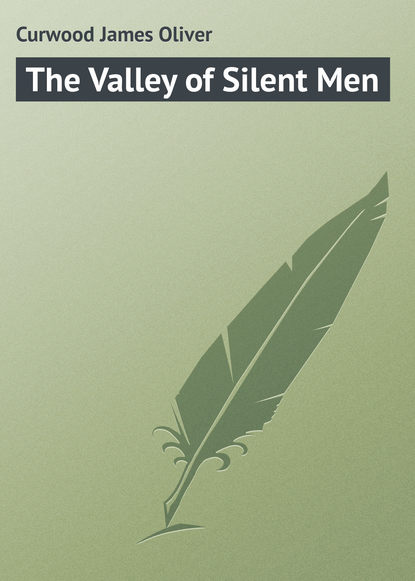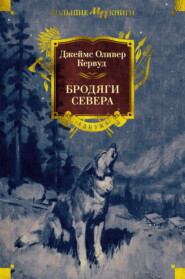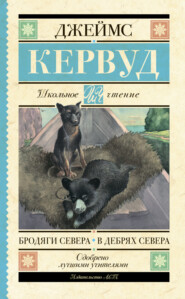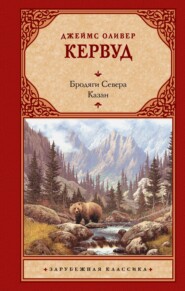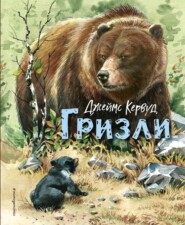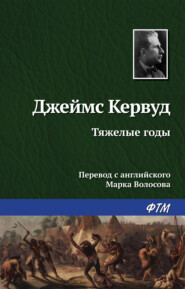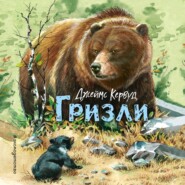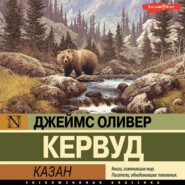По всем вопросам обращайтесь на: info@litportal.ru
(©) 2003-2024.
✖
The Valley of Silent Men
Автор
Год написания книги
2017
Настройки чтения
Размер шрифта
Высота строк
Поля
The Valley of Silent Men
James Curwood
Curwood James Oliver
The Valley of Silent Men / A Story of the Three River Country
THE VALLEY OF SILENT MEN
Before the railroad's thin lines of steel bit their way up through the wilderness, Athabasca Landing was the picturesque threshold over which one must step who would enter into the mystery and adventure of the great white North. It is still Iskwatam– the "door" which opens to the lower reaches of the Athabasca, the Slave, and the Mackenzie. It is somewhat difficult to find on the map, yet it is there, because its history is written in more than a hundred and forty years of romance and tragedy and adventure in the lives of men, and is not easily forgotten. Over the old trail it was about a hundred and fifty miles north of Edmonton. The railroad has brought it nearer to that base of civilization, but beyond it the wilderness still howls as it has howled for a thousand years, and the waters of a continent flow north and into the Arctic Ocean. It is possible that the beautiful dream of the real-estate dealers may come true, for the most avid of all the sportsmen of the earth, the money-hunters, have come up on the bumpy railroad that sometimes lights its sleeping cars with lanterns, and with them have come typewriters, and stenographers, and the art of printing advertisements, and the Golden Rule of those who sell handfuls of earth to hopeful purchasers thousands of miles away – "Do others as they would do you." And with it, too, has come the legitimate business of barter and trade, with eyes on all that treasure of the North which lies between the Grand Rapids of the Athabasca and the edge of the polar sea. But still more beautiful than the dream of fortunes quickly made is the deep-forest superstition that the spirits of the wilderness dead move onward as steam and steel advance, and if this is so, the ghosts of a thousand Pierres and Jacquelines have risen uneasily from their graves at Athabasca Landing, hunting a new quiet farther north.
For it was Pierre and Jacqueline, Henri and Marie, Jacques and his Jeanne, whose brown hands for a hundred and forty years opened and closed this door. And those hands still master a savage world for two thousand miles north of that threshold of Athabasca Landing. South of it a wheezy engine drags up the freight that came not so many months ago by boat.
It is over this threshold that the dark eyes of Pierre and Jacqueline, Henri and Marie, Jacques and his Jeanne, look into the blue and the gray and the sometimes watery ones of a destroying civilization. And there it is that the shriek of a mad locomotive mingles with their age-old river chants; the smut of coal drifts over their forests; the phonograph screeches its reply to le violon; and Pierre and Henri and Jacques no longer find themselves the kings of the earth when they come in from far countries with their precious cargoes of furs. And they no longer swagger and tell loud-voiced adventure, or sing their wild river songs in the same old abandon, for there are streets at Athabasca Landing now, and hotels, and schools, and rules and regulations of a kind new and terrifying to the bold of the old voyageurs.
It seems only yesterday that the railroad was not there, and a great world of wilderness lay between the Landing and the upper rim of civilization. And when word first came that a steam thing was eating its way up foot by foot through forest and swamp and impassable muskeg, that word passed up and down the water-ways for two thousand miles, a colossal joke, a stupendous bit of drollery, the funniest thing that Pierre and Henri and Jacques had heard in all their lives. And when Jacques wanted to impress upon Pierre his utter disbelief of a thing, he would say:
"It will happen, m'sieu, when the steam thing comes to the Landing, when cow-beasts eat with the moose, and when our bread is found for us in yonder swamps!"
And the steam thing came, and cows grazed where moose had fed, and bread WAS gathered close to the edge of the great swamps. Thus did civilization break into Athabasca Landing.
Northward from the Landing, for two thousand miles, reached the domain of the rivermen. And the Landing, with its two hundred and twenty-seven souls before the railroad came, was the wilderness clearing-house which sat at the beginning of things. To it came from the south all the freight which must go into the north; on its flat river front were built the great scows which carried this freight to the end of the earth. It was from the Landing that the greatest of all river brigades set forth upon their long adventures, and it was back to the Landing, perhaps a year or more later, that still smaller scows and huge canoes brought as the price of exchange their cargoes of furs.
Thus for nearly a century and a half the larger craft, with their great sweeps and their wild-throated crews, had gone down the river toward the Arctic Ocean, and the smaller craft, with their still wilder crews, had come up the river toward civilization. The River, as the Landing speaks of it, is the Athabasca, with its headwaters away off in the British Columbian mountains, where Baptiste and McLeod, explorers of old, gave up their lives to find where the cradle of it lay. And it sweeps past the Landing, a slow and mighty giant, unswervingly on its way to the northern sea. With it the river brigades set forth. For Pierre and Henri and Jacques it is going from one end to the other of the earth. The Athabasca ends and is replaced by the Slave, and the Slave empties into Great Slave Lake, and from the narrow tip of that Lake the Mackenzie carries on for more than a thousand miles to the sea.
In this distance of the long water trail one sees and hears many things. It is life. It is adventure. It is mystery and romance and hazard. Its tales are so many that books could not hold them. In the faces of men and women they are written. They lie buried in graves so old that the forest trees grow over them. Epics of tragedy, of love, of the fight to live! And as one goes farther north, and still farther, just so do the stories of things that have happened change.
For the world is changing, the sun is changing, and the breeds of men are changing. At the Landing in July there are seventeen hours of sunlight; at Fort Chippewyan there are eighteen; at Fort Resolution, Fort Simpson, and Fort Providence there are nineteen; at the Great Bear twenty-one, and at Fort McPherson, close to the polar sea, from twenty-two to twenty-three. And in December there are also these hours of darkness. With light and darkness men change, women change, and life changes. And Pierre and Henri and Jacques meet them all, but always THEY are the same, chanting the old songs, enshrining the old loves, dreaming the same dreams, and worshiping always the same gods. They meet a thousand perils with eyes that glisten with the love of adventure.
The thunder of rapids and the howlings of storm do not frighten them. Death has no fear for them. They grapple with it, wrestle joyously with it, and are glorious when they win. Their blood is red and strong. Their hearts are big. Their souls chant themselves up to the skies. Yet they are simple as children, and when they are afraid, it is of things which children fear. For in those hearts of theirs is superstition – and also, perhaps, royal blood. For princes and the sons of princes and the noblest aristocracy of France were the first of the gentlemen adventurers who came with ruffles on their sleeves and rapiers at their sides to seek furs worth many times their weight in gold two hundred and fifty years ago, and of these ancient forebears Pierre and Henri and Jacques, with their Maries and Jeannes and Jacquelines, are the living voices of today.
And these voices tell many stories. Sometimes they whisper them, as the wind would whisper, for there are stories weird and strange that must be spoken softly. They darken no printed pages. The trees listen to them beside red camp-fires at night. Lovers tell them in the glad sunshine of day. Some of them are chanted in song. Some of them come down through the generations, epics of the wilderness, remembered from father to son. And each year there are the new things to pass from mouth to mouth, from cabin to cabin, from the lower reaches of the Mackenzie to the far end of the world at Athabasca Landing. For the three rivers are always makers of romance, of tragedy, of adventure. The story will never be forgotten of how Follette and Ladouceur swam their mad race through the Death Chute for love of the girl who waited at the other end, or of how Campbell O'Doone, the red-headed giant at Fort Resolution, fought the whole of a great brigade in his effort to run away with a scow captain's daughter.
And the brigade loved O'Doone, though it beat him, for these men of the strong north love courage and daring. The epic of the lost scow – how there were men who saw it disappear from under their very eyes, floating upward and afterward riding swiftly away in the skies – is told and retold by strong-faced men, deep in whose eyes are the smoldering flames of an undying superstition, and these same men thrill as they tell over again the strange and unbelievable story of Hartshope, the aristocratic Englishman who set off into the North in all the glory of monocle and unprecedented luggage, and how he joined in a tribal war, became a chief of the Dog Ribs, and married a dark-eyed, sleek-haired, little Indian beauty, who is now the mother of his children.
But deepest and most thrilling of all the stories they tell are the stories of the long arm of the Law – that arm which reaches for two thousand miles from Athabasca Landing to the polar sea, the arm Of the Royal Northwest Mounted Police.
And of these it is the story of Jim Kent we are going to tell, of Jim Kent and of Marette, that wonderful little goddess of the Valley of Silent Men, in whose veins there must have run the blood of fighting men – and of ancient queens. A story of the days before the railroad came.
CHAPTER I
In the mind of James Grenfell Kent, sergeant in the Royal Northwest Mounted Police, there remained no shadow of a doubt. He knew that he was dying. He had implicit faith in Cardigan, his surgeon friend, and Cardigan had told him that what was left of his life would be measured out in hours – perhaps in minutes or seconds. It was an unusual case. There was one chance in fifty that he might live two or three days, but there was no chance at all that he would live more than three. The end might come with any breath he drew into his lungs. That was the pathological history of the thing, as far as medical and surgical science knew of cases similar to his own.
Personally, Kent did not feel like a dying man. His vision and his brain were clear. He felt no pain, and only at infrequent intervals was his temperature above normal. His voice was particularly calm and natural.
At first he had smiled incredulously when Cardigan broke the news. That the bullet which a drunken half-breed had sent into his chest two weeks before had nicked the arch of the aorta, thus forming an aneurism, was a statement by Cardigan which did not sound especially wicked or convincing to him. "Aorta" and "aneurism" held about as much significance for him as his perichondrium or the process of his stylomastoid. But Kent possessed an unswerving passion to grip at facts in detail, a characteristic that had largely helped him to earn the reputation of being the best man-hunter in all the northland service. So he had insisted, and his surgeon friend had explained.
The aorta, he found, was the main blood-vessel arching over and leading from the heart, and in nicking it the bullet had so weakened its outer wall that it bulged out in the form of a sack, just as the inner tube of an automobile tire bulges through the outer casing when there is a blowout.
"And when that sack gives way inside you," Cardigan had explained, "you'll go like that!" He snapped a forefinger and thumb to drive the fact home.
After that it was merely a matter of common sense to believe, and now, sure that he was about to die. Kent had acted. He was acting in the full health of his mind and in extreme cognizance of the paralyzing shock he was contributing as a final legacy to the world at large, or at least to that part of it which knew him or was interested. The tragedy of the thing did not oppress him. A thousand times in his life he had discovered that humor and tragedy were very closely related, and that there were times when only the breadth of a hair separated the two. Many times he had seen a laugh change suddenly to tears, and tears to laughter.
The tableau, as it presented itself about his bedside now, amused him. Its humor was grim, but even in these last hours of his life he appreciated it. He had always more or less regarded life as a joke – a very serious joke, but a joke for all that – a whimsical and trickful sort of thing played by the Great Arbiter on humanity at large; and this last count in his own life, as it was solemnly and tragically ticking itself off, was the greatest joke of all. The amazed faces that stared at him, their passing moments of disbelief, their repressed but at times visible betrayals of horror, the steadiness of their eyes, the tenseness of their lips – all added to what he might have called, at another time, the dramatic artistry of his last great adventure.
That he was dying did not chill him, or make him afraid, or put a tremble into his voice. The contemplation of throwing off the mere habit of breathing had never at any stage of his thirty-six years of life appalled him. Those years, because he had spent a sufficient number of them in the raw places of the earth, had given him a philosophy and viewpoint of his own, both of which he kept unto himself without effort to impress them on other people. He believed that life itself was the cheapest thing on the face of all the earth. All other things had their limitations.
There was so much water and so much land, so many mountains and so many plains, so many square feet to live on and so many square feet to be buried in. All things could be measured, and stood up, and catalogued – except life itself. "Given time," he would say, "a single pair of humans can populate all creation." Therefore, being the cheapest of all things, it was true philosophy that life should be the easiest of all things to give up when the necessity came.
Which is only another way of emphasizing that Kent was not, and never had been, afraid to die. But it does not say that he treasured life a whit less than the man in another room, who, a day or so before, had fought like a lunatic before going under an anesthetic for the amputation of a bad finger. No man had loved life more than he. No man had lived nearer it.
It had been a passion with him. Full of dreams, and always with anticipations ahead, no matter how far short realizations fell, he was an optimist, a lover of the sun and the moon and the stars, a worshiper of the forests and of the mountains, a man who loved his life, and who had fought for it, and yet who was ready – at the last – to yield it up without a whimper when the fates asked for it.
Bolstered up against his pillows, he did not look the part of the fiend he was confessing himself to be to the people about him. Sickness had not emaciated him. The bronze of his lean, clean-cut face had faded a little, but the tanning of wind and sun and campfire was still there. His blue eyes were perhaps dulled somewhat by the nearness of death. One would not have judged him to be thirty-six, even though over one temple there was a streak of gray in his blond hair – a heritage from his mother, who was dead. Looking at him, as his lips quietly and calmly confessed himself beyond the pale of men's sympathy or forgiveness, one would have said that his crime was impossible.
Through his window, as he sat bolstered up in his cot, Kent could see the slow-moving shimmer of the great Athabasca River as it moved on its way toward the Arctic Ocean. The sun was shining, and he saw the cool, thick masses of the spruce and cedar forests beyond, the rising undulations of wilderness ridges and hills, and through that open window he caught the sweet scents that came with a soft wind from out of the forests he had loved for so many years.
"They've been my best friends," he had said to Cardigan, "and when this nice little thing you're promising happens to me, old man, I want to go with my eyes on them."
So his cot was close to the window.
Nearest to him sat Cardigan. In his face, more than in any of the others, was disbelief. Kedsty, Inspector of the Royal Northwest Mounted Police, in charge of N Division during an indefinite leave of absence of the superintendent, was paler even than the girl whose nervous fingers were swiftly putting upon paper every word that was spoken by those in the room. O'Connor, staff-sergeant, was like one struck dumb. The little, smooth-faced Catholic missioner whose presence as a witness Kent had requested, sat with his thin fingers tightly interlaced, silently placing this among all the other strange tragedies that the wilderness had given up to him. They had all been Kent's friends, his intimate friends, with the exception of the girl, whom Inspector Kedsty had borrowed for the occasion. With the little missioner he had spent many an evening, exchanging in mutual confidence the strange and mysterious happenings of the deep forests, and of the great north beyond the forests. O'Connor's friendship was a friendship bred of the brotherhood of the trails. It was Kent and O'Connor who had brought down the two Eskimo murderers from the mouth of the Mackenzie, and the adventure had taken them fourteen months. Kent loved O'Connor, with his red face, his red hair, and his big heart, and to him the most tragic part of it all was that he was breaking this friendship now.
But it was Inspector Kedsty, commanding N Division, the biggest and wildest division in all the Northland, that roused in Kent an unusual emotion, even as he waited for that explosion just over his heart which the surgeon had told him might occur at any moment. On his death-bed his mind still worked analytically. And Kedsty, since the moment he had entered the room, had puzzled Kent. The commander of N Division was an unusual man. He was sixty, with iron-gray hair, cold, almost colorless eyes in which one would search long for a gleam of either mercy or fear, and a nerve that Kent had never seen even slightly disturbed. It took such a man, an iron man, to run N Division according to law, for N Division covered an area of six hundred and twenty thousand square miles of wildest North America, extending more than two thousand miles north of the 70th parallel of latitude, with its farthest limit three and one-half degrees within the Arctic Circle. To police this area meant upholding the law in a country fourteen times the size of the state of Ohio. And Kedsty was the man who had performed this duty as only one other man had ever succeeded in doing it.
Yet Kedsty, of the five about Kent, was most disturbed. His face was ash-gray. A number of times Kent had detected a broken note in his voice. He had seen his hands grip at the arms of the chair he sat in until the cords stood out on them as if about to burst. He had never seen Kedsty sweat until now.
Twice the Inspector had wiped his forehead with a handkerchief. He was no longer Minisak– "The Rock" – a name given to him by the Crees. The armor that no shaft had ever penetrated seemed to have dropped from him. He had ceased to be Kedsty, the most dreaded inquisitor in the service. He was nervous, and Kent could see that he was fighting to repossess himself.
"Of course you know what this means to the Service," he said in a hard, low voice. "It means – "
"Disgrace," nodded Kent. "I know. It means a black spot on the otherwise bright escutcheon of N Division. But it can't be helped. I killed John Barkley. The man you've got in the guard-house, condemned to be hanged by the neck until he is dead, is innocent. I understand. It won't be nice for the Service to let it be known that a sergeant in His Majesty's Royal Mounted is an ordinary murderer, but – "
"Not an ordinary murderer," interrupted Kedsty. "As you have described it, the crime was deliberate – horrible and inexcusable to its last detail. You were not moved by a sudden passion. You tortured your victim. It is inconceivable!"
"And yet true," said Kent.
He was looking at the stenographer's slim fingers as they put down his words and Kedsty's. A bit of sunshine touched her bowed head, and he observed the red lights in her hair. His eyes swept to O'Connor, and in that moment the commander of N Division bent over him, so close that his face almost touched Kent's, and he whispered, in a voice so low that no one of the other four could hear,
"Kent – you lie!"
"No, it is true," replied Kent.
Kedsty drew back, again wiping the moisture from his forehead.
"I killed Barkley, and I killed him as I planned that he should die," Kent went on. "It was my desire that he should suffer. The one thing which I shall not tell you is why I killed him. But it was a sufficient reason."
He saw the shuddering tremor that swept through the shoulders of the girl who was putting down the condemning notes.
"And you refuse to confess your motive?"
James Curwood
Curwood James Oliver
The Valley of Silent Men / A Story of the Three River Country
THE VALLEY OF SILENT MEN
Before the railroad's thin lines of steel bit their way up through the wilderness, Athabasca Landing was the picturesque threshold over which one must step who would enter into the mystery and adventure of the great white North. It is still Iskwatam– the "door" which opens to the lower reaches of the Athabasca, the Slave, and the Mackenzie. It is somewhat difficult to find on the map, yet it is there, because its history is written in more than a hundred and forty years of romance and tragedy and adventure in the lives of men, and is not easily forgotten. Over the old trail it was about a hundred and fifty miles north of Edmonton. The railroad has brought it nearer to that base of civilization, but beyond it the wilderness still howls as it has howled for a thousand years, and the waters of a continent flow north and into the Arctic Ocean. It is possible that the beautiful dream of the real-estate dealers may come true, for the most avid of all the sportsmen of the earth, the money-hunters, have come up on the bumpy railroad that sometimes lights its sleeping cars with lanterns, and with them have come typewriters, and stenographers, and the art of printing advertisements, and the Golden Rule of those who sell handfuls of earth to hopeful purchasers thousands of miles away – "Do others as they would do you." And with it, too, has come the legitimate business of barter and trade, with eyes on all that treasure of the North which lies between the Grand Rapids of the Athabasca and the edge of the polar sea. But still more beautiful than the dream of fortunes quickly made is the deep-forest superstition that the spirits of the wilderness dead move onward as steam and steel advance, and if this is so, the ghosts of a thousand Pierres and Jacquelines have risen uneasily from their graves at Athabasca Landing, hunting a new quiet farther north.
For it was Pierre and Jacqueline, Henri and Marie, Jacques and his Jeanne, whose brown hands for a hundred and forty years opened and closed this door. And those hands still master a savage world for two thousand miles north of that threshold of Athabasca Landing. South of it a wheezy engine drags up the freight that came not so many months ago by boat.
It is over this threshold that the dark eyes of Pierre and Jacqueline, Henri and Marie, Jacques and his Jeanne, look into the blue and the gray and the sometimes watery ones of a destroying civilization. And there it is that the shriek of a mad locomotive mingles with their age-old river chants; the smut of coal drifts over their forests; the phonograph screeches its reply to le violon; and Pierre and Henri and Jacques no longer find themselves the kings of the earth when they come in from far countries with their precious cargoes of furs. And they no longer swagger and tell loud-voiced adventure, or sing their wild river songs in the same old abandon, for there are streets at Athabasca Landing now, and hotels, and schools, and rules and regulations of a kind new and terrifying to the bold of the old voyageurs.
It seems only yesterday that the railroad was not there, and a great world of wilderness lay between the Landing and the upper rim of civilization. And when word first came that a steam thing was eating its way up foot by foot through forest and swamp and impassable muskeg, that word passed up and down the water-ways for two thousand miles, a colossal joke, a stupendous bit of drollery, the funniest thing that Pierre and Henri and Jacques had heard in all their lives. And when Jacques wanted to impress upon Pierre his utter disbelief of a thing, he would say:
"It will happen, m'sieu, when the steam thing comes to the Landing, when cow-beasts eat with the moose, and when our bread is found for us in yonder swamps!"
And the steam thing came, and cows grazed where moose had fed, and bread WAS gathered close to the edge of the great swamps. Thus did civilization break into Athabasca Landing.
Northward from the Landing, for two thousand miles, reached the domain of the rivermen. And the Landing, with its two hundred and twenty-seven souls before the railroad came, was the wilderness clearing-house which sat at the beginning of things. To it came from the south all the freight which must go into the north; on its flat river front were built the great scows which carried this freight to the end of the earth. It was from the Landing that the greatest of all river brigades set forth upon their long adventures, and it was back to the Landing, perhaps a year or more later, that still smaller scows and huge canoes brought as the price of exchange their cargoes of furs.
Thus for nearly a century and a half the larger craft, with their great sweeps and their wild-throated crews, had gone down the river toward the Arctic Ocean, and the smaller craft, with their still wilder crews, had come up the river toward civilization. The River, as the Landing speaks of it, is the Athabasca, with its headwaters away off in the British Columbian mountains, where Baptiste and McLeod, explorers of old, gave up their lives to find where the cradle of it lay. And it sweeps past the Landing, a slow and mighty giant, unswervingly on its way to the northern sea. With it the river brigades set forth. For Pierre and Henri and Jacques it is going from one end to the other of the earth. The Athabasca ends and is replaced by the Slave, and the Slave empties into Great Slave Lake, and from the narrow tip of that Lake the Mackenzie carries on for more than a thousand miles to the sea.
In this distance of the long water trail one sees and hears many things. It is life. It is adventure. It is mystery and romance and hazard. Its tales are so many that books could not hold them. In the faces of men and women they are written. They lie buried in graves so old that the forest trees grow over them. Epics of tragedy, of love, of the fight to live! And as one goes farther north, and still farther, just so do the stories of things that have happened change.
For the world is changing, the sun is changing, and the breeds of men are changing. At the Landing in July there are seventeen hours of sunlight; at Fort Chippewyan there are eighteen; at Fort Resolution, Fort Simpson, and Fort Providence there are nineteen; at the Great Bear twenty-one, and at Fort McPherson, close to the polar sea, from twenty-two to twenty-three. And in December there are also these hours of darkness. With light and darkness men change, women change, and life changes. And Pierre and Henri and Jacques meet them all, but always THEY are the same, chanting the old songs, enshrining the old loves, dreaming the same dreams, and worshiping always the same gods. They meet a thousand perils with eyes that glisten with the love of adventure.
The thunder of rapids and the howlings of storm do not frighten them. Death has no fear for them. They grapple with it, wrestle joyously with it, and are glorious when they win. Their blood is red and strong. Their hearts are big. Their souls chant themselves up to the skies. Yet they are simple as children, and when they are afraid, it is of things which children fear. For in those hearts of theirs is superstition – and also, perhaps, royal blood. For princes and the sons of princes and the noblest aristocracy of France were the first of the gentlemen adventurers who came with ruffles on their sleeves and rapiers at their sides to seek furs worth many times their weight in gold two hundred and fifty years ago, and of these ancient forebears Pierre and Henri and Jacques, with their Maries and Jeannes and Jacquelines, are the living voices of today.
And these voices tell many stories. Sometimes they whisper them, as the wind would whisper, for there are stories weird and strange that must be spoken softly. They darken no printed pages. The trees listen to them beside red camp-fires at night. Lovers tell them in the glad sunshine of day. Some of them are chanted in song. Some of them come down through the generations, epics of the wilderness, remembered from father to son. And each year there are the new things to pass from mouth to mouth, from cabin to cabin, from the lower reaches of the Mackenzie to the far end of the world at Athabasca Landing. For the three rivers are always makers of romance, of tragedy, of adventure. The story will never be forgotten of how Follette and Ladouceur swam their mad race through the Death Chute for love of the girl who waited at the other end, or of how Campbell O'Doone, the red-headed giant at Fort Resolution, fought the whole of a great brigade in his effort to run away with a scow captain's daughter.
And the brigade loved O'Doone, though it beat him, for these men of the strong north love courage and daring. The epic of the lost scow – how there were men who saw it disappear from under their very eyes, floating upward and afterward riding swiftly away in the skies – is told and retold by strong-faced men, deep in whose eyes are the smoldering flames of an undying superstition, and these same men thrill as they tell over again the strange and unbelievable story of Hartshope, the aristocratic Englishman who set off into the North in all the glory of monocle and unprecedented luggage, and how he joined in a tribal war, became a chief of the Dog Ribs, and married a dark-eyed, sleek-haired, little Indian beauty, who is now the mother of his children.
But deepest and most thrilling of all the stories they tell are the stories of the long arm of the Law – that arm which reaches for two thousand miles from Athabasca Landing to the polar sea, the arm Of the Royal Northwest Mounted Police.
And of these it is the story of Jim Kent we are going to tell, of Jim Kent and of Marette, that wonderful little goddess of the Valley of Silent Men, in whose veins there must have run the blood of fighting men – and of ancient queens. A story of the days before the railroad came.
CHAPTER I
In the mind of James Grenfell Kent, sergeant in the Royal Northwest Mounted Police, there remained no shadow of a doubt. He knew that he was dying. He had implicit faith in Cardigan, his surgeon friend, and Cardigan had told him that what was left of his life would be measured out in hours – perhaps in minutes or seconds. It was an unusual case. There was one chance in fifty that he might live two or three days, but there was no chance at all that he would live more than three. The end might come with any breath he drew into his lungs. That was the pathological history of the thing, as far as medical and surgical science knew of cases similar to his own.
Personally, Kent did not feel like a dying man. His vision and his brain were clear. He felt no pain, and only at infrequent intervals was his temperature above normal. His voice was particularly calm and natural.
At first he had smiled incredulously when Cardigan broke the news. That the bullet which a drunken half-breed had sent into his chest two weeks before had nicked the arch of the aorta, thus forming an aneurism, was a statement by Cardigan which did not sound especially wicked or convincing to him. "Aorta" and "aneurism" held about as much significance for him as his perichondrium or the process of his stylomastoid. But Kent possessed an unswerving passion to grip at facts in detail, a characteristic that had largely helped him to earn the reputation of being the best man-hunter in all the northland service. So he had insisted, and his surgeon friend had explained.
The aorta, he found, was the main blood-vessel arching over and leading from the heart, and in nicking it the bullet had so weakened its outer wall that it bulged out in the form of a sack, just as the inner tube of an automobile tire bulges through the outer casing when there is a blowout.
"And when that sack gives way inside you," Cardigan had explained, "you'll go like that!" He snapped a forefinger and thumb to drive the fact home.
After that it was merely a matter of common sense to believe, and now, sure that he was about to die. Kent had acted. He was acting in the full health of his mind and in extreme cognizance of the paralyzing shock he was contributing as a final legacy to the world at large, or at least to that part of it which knew him or was interested. The tragedy of the thing did not oppress him. A thousand times in his life he had discovered that humor and tragedy were very closely related, and that there were times when only the breadth of a hair separated the two. Many times he had seen a laugh change suddenly to tears, and tears to laughter.
The tableau, as it presented itself about his bedside now, amused him. Its humor was grim, but even in these last hours of his life he appreciated it. He had always more or less regarded life as a joke – a very serious joke, but a joke for all that – a whimsical and trickful sort of thing played by the Great Arbiter on humanity at large; and this last count in his own life, as it was solemnly and tragically ticking itself off, was the greatest joke of all. The amazed faces that stared at him, their passing moments of disbelief, their repressed but at times visible betrayals of horror, the steadiness of their eyes, the tenseness of their lips – all added to what he might have called, at another time, the dramatic artistry of his last great adventure.
That he was dying did not chill him, or make him afraid, or put a tremble into his voice. The contemplation of throwing off the mere habit of breathing had never at any stage of his thirty-six years of life appalled him. Those years, because he had spent a sufficient number of them in the raw places of the earth, had given him a philosophy and viewpoint of his own, both of which he kept unto himself without effort to impress them on other people. He believed that life itself was the cheapest thing on the face of all the earth. All other things had their limitations.
There was so much water and so much land, so many mountains and so many plains, so many square feet to live on and so many square feet to be buried in. All things could be measured, and stood up, and catalogued – except life itself. "Given time," he would say, "a single pair of humans can populate all creation." Therefore, being the cheapest of all things, it was true philosophy that life should be the easiest of all things to give up when the necessity came.
Which is only another way of emphasizing that Kent was not, and never had been, afraid to die. But it does not say that he treasured life a whit less than the man in another room, who, a day or so before, had fought like a lunatic before going under an anesthetic for the amputation of a bad finger. No man had loved life more than he. No man had lived nearer it.
It had been a passion with him. Full of dreams, and always with anticipations ahead, no matter how far short realizations fell, he was an optimist, a lover of the sun and the moon and the stars, a worshiper of the forests and of the mountains, a man who loved his life, and who had fought for it, and yet who was ready – at the last – to yield it up without a whimper when the fates asked for it.
Bolstered up against his pillows, he did not look the part of the fiend he was confessing himself to be to the people about him. Sickness had not emaciated him. The bronze of his lean, clean-cut face had faded a little, but the tanning of wind and sun and campfire was still there. His blue eyes were perhaps dulled somewhat by the nearness of death. One would not have judged him to be thirty-six, even though over one temple there was a streak of gray in his blond hair – a heritage from his mother, who was dead. Looking at him, as his lips quietly and calmly confessed himself beyond the pale of men's sympathy or forgiveness, one would have said that his crime was impossible.
Through his window, as he sat bolstered up in his cot, Kent could see the slow-moving shimmer of the great Athabasca River as it moved on its way toward the Arctic Ocean. The sun was shining, and he saw the cool, thick masses of the spruce and cedar forests beyond, the rising undulations of wilderness ridges and hills, and through that open window he caught the sweet scents that came with a soft wind from out of the forests he had loved for so many years.
"They've been my best friends," he had said to Cardigan, "and when this nice little thing you're promising happens to me, old man, I want to go with my eyes on them."
So his cot was close to the window.
Nearest to him sat Cardigan. In his face, more than in any of the others, was disbelief. Kedsty, Inspector of the Royal Northwest Mounted Police, in charge of N Division during an indefinite leave of absence of the superintendent, was paler even than the girl whose nervous fingers were swiftly putting upon paper every word that was spoken by those in the room. O'Connor, staff-sergeant, was like one struck dumb. The little, smooth-faced Catholic missioner whose presence as a witness Kent had requested, sat with his thin fingers tightly interlaced, silently placing this among all the other strange tragedies that the wilderness had given up to him. They had all been Kent's friends, his intimate friends, with the exception of the girl, whom Inspector Kedsty had borrowed for the occasion. With the little missioner he had spent many an evening, exchanging in mutual confidence the strange and mysterious happenings of the deep forests, and of the great north beyond the forests. O'Connor's friendship was a friendship bred of the brotherhood of the trails. It was Kent and O'Connor who had brought down the two Eskimo murderers from the mouth of the Mackenzie, and the adventure had taken them fourteen months. Kent loved O'Connor, with his red face, his red hair, and his big heart, and to him the most tragic part of it all was that he was breaking this friendship now.
But it was Inspector Kedsty, commanding N Division, the biggest and wildest division in all the Northland, that roused in Kent an unusual emotion, even as he waited for that explosion just over his heart which the surgeon had told him might occur at any moment. On his death-bed his mind still worked analytically. And Kedsty, since the moment he had entered the room, had puzzled Kent. The commander of N Division was an unusual man. He was sixty, with iron-gray hair, cold, almost colorless eyes in which one would search long for a gleam of either mercy or fear, and a nerve that Kent had never seen even slightly disturbed. It took such a man, an iron man, to run N Division according to law, for N Division covered an area of six hundred and twenty thousand square miles of wildest North America, extending more than two thousand miles north of the 70th parallel of latitude, with its farthest limit three and one-half degrees within the Arctic Circle. To police this area meant upholding the law in a country fourteen times the size of the state of Ohio. And Kedsty was the man who had performed this duty as only one other man had ever succeeded in doing it.
Yet Kedsty, of the five about Kent, was most disturbed. His face was ash-gray. A number of times Kent had detected a broken note in his voice. He had seen his hands grip at the arms of the chair he sat in until the cords stood out on them as if about to burst. He had never seen Kedsty sweat until now.
Twice the Inspector had wiped his forehead with a handkerchief. He was no longer Minisak– "The Rock" – a name given to him by the Crees. The armor that no shaft had ever penetrated seemed to have dropped from him. He had ceased to be Kedsty, the most dreaded inquisitor in the service. He was nervous, and Kent could see that he was fighting to repossess himself.
"Of course you know what this means to the Service," he said in a hard, low voice. "It means – "
"Disgrace," nodded Kent. "I know. It means a black spot on the otherwise bright escutcheon of N Division. But it can't be helped. I killed John Barkley. The man you've got in the guard-house, condemned to be hanged by the neck until he is dead, is innocent. I understand. It won't be nice for the Service to let it be known that a sergeant in His Majesty's Royal Mounted is an ordinary murderer, but – "
"Not an ordinary murderer," interrupted Kedsty. "As you have described it, the crime was deliberate – horrible and inexcusable to its last detail. You were not moved by a sudden passion. You tortured your victim. It is inconceivable!"
"And yet true," said Kent.
He was looking at the stenographer's slim fingers as they put down his words and Kedsty's. A bit of sunshine touched her bowed head, and he observed the red lights in her hair. His eyes swept to O'Connor, and in that moment the commander of N Division bent over him, so close that his face almost touched Kent's, and he whispered, in a voice so low that no one of the other four could hear,
"Kent – you lie!"
"No, it is true," replied Kent.
Kedsty drew back, again wiping the moisture from his forehead.
"I killed Barkley, and I killed him as I planned that he should die," Kent went on. "It was my desire that he should suffer. The one thing which I shall not tell you is why I killed him. But it was a sufficient reason."
He saw the shuddering tremor that swept through the shoulders of the girl who was putting down the condemning notes.
"And you refuse to confess your motive?"





